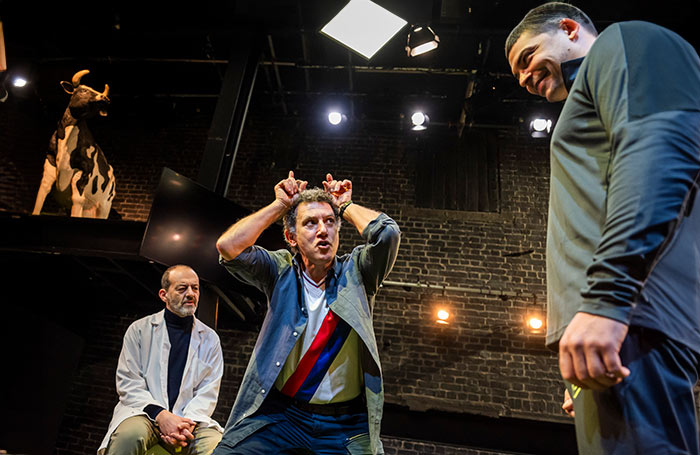The Arcola Theatre, London – until 2 March 2024
Reviewed by Mandi Riggi
3***
“When You Pass Over My Tomb” is a thought-provoking and somewhat humorous play that attempts to explore the theme of death through a meta-theatrical lens. The playwright, Sergio Blanco, borrows from various sources, including famous literary works and macabre historical events, creating a mishmash of “body parts” that ultimately feel disjointed and unfinished. While the first half of the play showcases wit and cleverness, the second half feels rushed and underwhelming.
The protagonist, Sergio, portrayed adeptly by Al Nedjari, is a self-indulgent man whose literary legacy blurs the line between truth and fiction. Khaled, energetically played by Charlie MacGechan, is an Iranian inmate at London’s Bethlem Hospital with a disturbing affinity for necrophilia.
Sergio, in his quest for a unique way to die, proposes the idea of donating his body to Khaled for his posthumous desires. Thus, the play transitions from a macabre concept to a somewhat clinical love story. We follow Sergio on his existential journey to an assisted-suicide clinic on Lake Geneva, where he meets Dr. Godwin, portrayed convincingly by Danny Scheinmann, who is willing to help him with his suicide. Despite Sergio’s lack of illness, Dr. Godwin has no qualms about assisting him. The clinic’s proximity to the birthplace of Frankenstein’s monster, with a view of the villa where Mary Shelley wrote her famous novel, adds an intriguing backdrop to the story.
While Sergio’s initial idea for control over his own demise carries a humorous tone, the lack of conflict and resistance along his journey highlights the shallow depth of the narrative. The play’s attempts at cultural allusions to death, encompassing religious imagery and references to popular culture, often feel forced and fail to provide meaningful insight. Additionally, the revelation of Khaled’s Iranian background, along with the mention of his parents’ tragic fate at the hands of revolutionary guards, seems more like a superficial attempt to be unconventional rather than serving a purpose in the story.
“When You Pass Over My Tomb” presents death as an inevitable part of life, but its reliance on borrowed ideas and disjointed structure left me, as an audience member, feeling unsatisfied and disconnected from the characters’ experiences. Although I had hoped to be enamoured by the play, I ultimately found it difficult to fully embrace and appreciate

